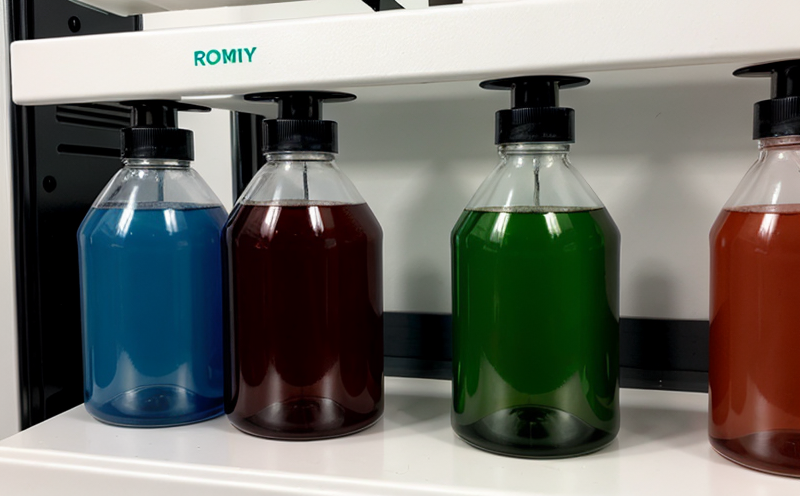JIS K7212 Combustion Reactivity Testing of Polymers
The JIS K7212 standard is one of the most widely recognized and used international standards for testing the combustion reactivity of polymers. This test measures the rate at which a polymer ignites, burns, and extinguishes in an oxygen-rich environment. The primary objective is to assess the material's propensity to ignite under controlled conditions, providing valuable insights into its safety classification.
The JIS K7212 procedure involves placing a standardized specimen on a metal strip that is heated to a specific temperature for 5 seconds. After ignition, the specimen is placed in an oxygen-rich environment where it burns until extinguished or the test ends. The results are reported based on several parameters including the time to ignition, flame spread rate, and total heat release.
This testing method is crucial for industries that handle polymers such as plastics and rubbers, ensuring they meet safety regulations set by governing bodies worldwide. By understanding a polymer's combustion reactivity, manufacturers can make informed decisions about material selection, formulation adjustments, and process optimization to enhance product safety and regulatory compliance.
The test results are also essential for insurance companies when assessing the risk associated with storing or using polymers in various environments. Additionally, this data is often required by regulatory bodies during certification processes, ensuring that products meet stringent safety standards before they reach the market.
Understanding the combustion reactivity of a polymer helps prevent potential hazards such as fires and explosions. By conducting JIS K7212 testing, manufacturers can identify materials with higher risks early in the development process, allowing for timely adjustments to formulation or processing methods. This proactive approach not only enhances product safety but also reduces the likelihood of recalls and associated costs.
Compliance with international standards like JIS K7212 is becoming increasingly important as global regulations evolve. Non-compliance can result in legal action, financial penalties, and damage to a company's reputation. By leveraging this testing service, businesses ensure they remain up-to-date with the latest safety requirements and industry best practices.
- Customer Impact: Improved product safety, enhanced compliance, reduced risk of recalls.
- Satisfaction: Accurate results leading to confident decision-making in material selection and process optimization.
Applied Standards
The JIS K7212 standard is part of the broader set of Japanese Industrial Standards (JIS) that govern various aspects of product safety, quality, and performance. This specific test follows stringent protocols outlined in the JIS K7212 document, which provides detailed instructions on specimen preparation, testing conditions, and result interpretation.
The standard is recognized globally for its rigorous approach to measuring combustion reactivity, making it a preferred choice by many industries. Compliance with this standard ensures that products meet international safety standards, facilitating easier exportation and importation across borders.
Other related standards include ISO 13943, which deals with the flammability classification of plastics; ASTM E606, focusing on the determination of the heat release rate during combustion; and UL 746, providing criteria for flame retardant materials. While these standards address different aspects of polymer safety, JIS K7212 specifically targets combustion reactivity.
By adhering to multiple international standards, manufacturers can ensure their products are safe not only within Japan but also in other markets that have adopted similar regulations. This comprehensive approach enhances product reliability and market acceptance, fostering trust among consumers and regulatory bodies.
Customer Impact and Satisfaction
- Informed Decision-Making: Businesses can make well-informed decisions regarding material selection and process optimization based on accurate test results.
- Regulatory Compliance: Ensures that products meet international safety standards, facilitating easier exportation and importation across borders.
- Risk Mitigation: Identifies materials with higher combustion reactivity early in the development process, allowing for timely adjustments to formulations or processing methods.
The JIS K7212 testing service offers numerous benefits to customers. Manufacturers can enhance product safety by identifying potential hazards during the design phase, ensuring compliance with international regulations, and reducing the risk of recalls due to non-compliance issues. This proactive approach not only enhances customer satisfaction but also protects brand reputation.
By leveraging this testing service, businesses ensure they are up-to-date with the latest safety requirements and industry best practices. The accurate results provided by our laboratory help customers make confident decisions in material selection and process optimization, ultimately leading to safer products and increased market acceptance.
Environmental and Sustainability Contributions
The JIS K7212 combustion reactivity testing plays a significant role in promoting sustainable practices within the polymer industry. By identifying polymers with lower combustion reactivity, manufacturers can reduce the environmental impact associated with fire risks. This not only minimizes the potential for fires and explosions but also helps prevent the release of harmful gases into the atmosphere.
Moreover, understanding the combustion behavior of polymers allows for the development of more sustainable products. For instance, flame retardant additives can be optimized to achieve desired levels of safety without compromising on environmental friendliness. This approach ensures that materials are both safe and eco-friendly, contributing positively to sustainability goals.
The JIS K7212 test results also inform the formulation of new polymers with improved properties, such as lower flammability or better heat resistance. These advancements can lead to products that perform better under extreme conditions while maintaining a low environmental footprint. By integrating these sustainable practices into production processes, businesses contribute to global efforts in reducing carbon emissions and promoting cleaner environments.





